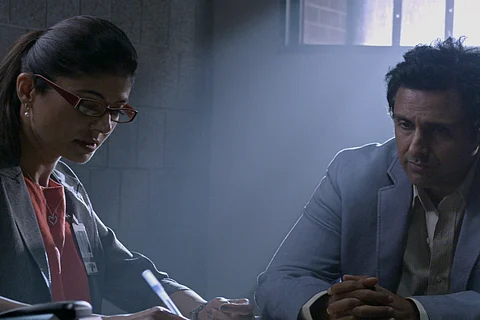Mirror Game Review: A Semi-Competent Whodunit
Director: Vijit Sharma
Cast: Parvin Dabas, Dhruv Bali, Omi Vaidya, Sneha Ramachander
The game actually begins right during the opening credits sequence. Elaborate mental health disorder terms flash up on screen before the letters rearrange themselves into the actors' names. On being immediately exposed to words like 'schizophrenia' and 'multiple personality disorder,' years of psychological thrillers have conditioned our minds to expect a certain template: the plot might take us down a particular route, and then slowly force us to doubt our own interpretation of what we've seen. The (chess) game is in fact between the machinations of the story and the viewers' relentless urge to second-guess its outlandish possibilities. Usually, it's an identity-based illusion that defines the inevitable twist – that of the protagonist/victim not being as reliable as we were led to believe all along.
Fast-paced, physically confined thrillers like Non-Stop (starring Liam Neeson) and Flightplan (starring Jodie Foster) – both with grieving, mentally unstable "heroes" – turn their victims into raging underdogs, to an extent where even we stop trusting them. The trick, though, is leave just about enough room for redemption; and just enough bandwidth for us to continue empathizing with them, irrespective of our changing perspectives. It's fine if their personalities are repulsive within the universe of the film, but the audience should never be led to dislike them. And perhaps that's where an otherwise intriguing drama like Mirror Game loses out.

Parvin Dabas plays NRI and Jersey-based psychiatric professor Jay Verma, a fragile man still haunted by the controversial suicide of an ex-student. His (vamp caricature) wife is most likely having an affair, and wants a divorce.
However, far from feeling for him, we never really warm up to this guy. He makes us feel uneasy. Dabas is perhaps a bit too ambiguous. In fact, he acts like the creepy neighbourhood predator, casually inviting students home for a drink to discuss their research papers. He could even be a menace to society – he decides to blackmail one of his promising new students Ronnie (Dhruv Bali) into agreeing to kill his wife. Soon, a desi detective (Sneha Ramachander) assigned to this 'missing persons' case starts to unravel the details, thereby serving as the eyes and ears of the audience. She exists, just like most good-hearted cinematic cops do, to guide us how to think and not overthink. Pooja Batra, too, returns in a very brief role as a criminal psychologist.
Most of Mirror Game is engaging because many of its faces, including Omi Vaidya's (Chatur from 3 Idiots), look and sound like they belong to this quiet, gloomy Asian-heavy suburb. Their slight accents, gait, dysfunctional situations and monotonous body language depict the sort of no-nonsense immigrant culture that has somewhat lost its essence in the pursuit of the mythical American dream. They might be Indians living abroad, but they're actually simply conflicted timeworn adults who mess up in dollars instead of rupees.
The problem with a grey-ish character like Jay is that he virtually starts off as an irredeemable villain. I understand that the writer wants to push him into a corner before turning the page – but this corner is so definite, dark and murky that I'm not sure I wanted him to get out of it. It's a very fine line, a tightrope act that most action thrillers tend to thrive on. But whodunits need to be far more designed. The film commits so hard into fooling us that when it tries to backtrack and prove its cleverness, it uses some very lazy contrivances. Suddenly, everyone is a prop.
Parvin Dabas plays NRI and Jersey-based psychiatric professor Jay Verma, a fragile man still haunted by the controversial suicide of an ex-student
The ambition is there, as is the atmosphere and subversion; it's just that the eventual payoff doesn't demand our investment. Either way, Jay needs professional help, and counting on his imbalance to push forward the convention of the final act is a bit futile.
I'd still be interested in what first-time director Vijit Sharma comes up with next. Maybe I'm overly critical here because his is almost a good film. His tone is correct, as is his command over his environment's peripheral hues; a couple of scenes on the personal life of the detective may not have seemed organic, but they only help in reiterating an investigation's slow-burning temperament. A few redundant filmy motifs aside – enough of the damn chess metaphors please – some fine-tuning could see him evolve into a fairly original thinker.
Watch the trailer here:

